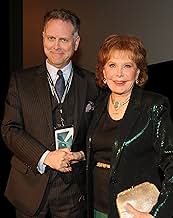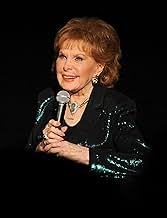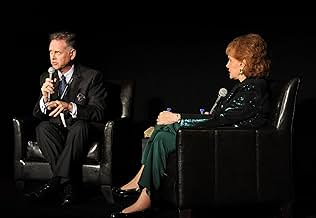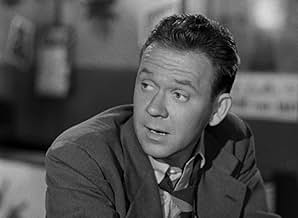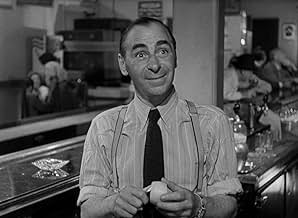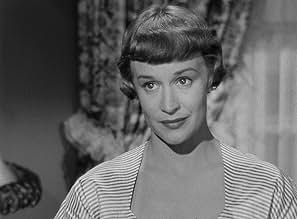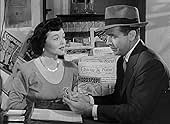VALUTAZIONE IMDb
7,3/10
2951
LA TUA VALUTAZIONE
Aggiungi una trama nella tua linguaEx-con Rocky Mulloy seeks the real culprit in the crime for which he was framed in a night world of deceptive dames and double crosses.Ex-con Rocky Mulloy seeks the real culprit in the crime for which he was framed in a night world of deceptive dames and double crosses.Ex-con Rocky Mulloy seeks the real culprit in the crime for which he was framed in a night world of deceptive dames and double crosses.
- Regia
- Sceneggiatura
- Star
Hy Averback
- Bookie
- (as Hy Averbach)
Leon Alton
- Bartender
- (non citato nei titoli originali)
Robert Bice
- Castro's Gunman
- (non citato nei titoli originali)
Ralph Brooks
- Nightclub Patron
- (non citato nei titoli originali)
Paul Cristo
- Waiter
- (non citato nei titoli originali)
Sayre Dearing
- Cop
- (non citato nei titoli originali)
Recensioni in evidenza
This film was shot on location in and around the Bunker Hill area of Los Angeles in the 1950's. The seedy trailer park, the crummy cocktail bars, and the Union Station (built in 1939) are the backdrop for a much better than average tale of revenge. Dick Powell gets off a train at the Union Station after spending 5 years in prison for a crime he didn't commit. He is met by a cop (Regis Toomey) that thinks he not only did the crime, but that he has stashed the loot. Also on the welcoming committee is Richard Erdman as an alcoholic former Marine that provided Powell with an alibi that got him out of prison. Rhonda Fleming plays the wife of a pal of Powell's that remains in prison for the crime. Powell intends to prove not only his innocence, but that of his buddy.
Add to the mix William Conrad as a bad guy with his own agenda and you have a better than average noir. The dialog between Powell and Erdman is dark and funny at the same time. The cinematography captures a part of Los Angeles that fell under the urban renewal wrecking ball that ripped the soul out of this part of the city. Not the greatest film noir ever made, but one of my favorites. Why isn't this film out on DVD?
Add to the mix William Conrad as a bad guy with his own agenda and you have a better than average noir. The dialog between Powell and Erdman is dark and funny at the same time. The cinematography captures a part of Los Angeles that fell under the urban renewal wrecking ball that ripped the soul out of this part of the city. Not the greatest film noir ever made, but one of my favorites. Why isn't this film out on DVD?
Cry Danger (1951)
Humphrey Bogart smiles. Robert Mitchum smiles. Lots of tough film noir types also show a grin or manage a laugh. But not Dick Powell. Forever grim and determined, he is a the archetype of an unhappy man, and usually, as in "Cry Danger," he's out to fix some problem.
This is a Dick Powell movie all the way, and a really good one. There are some great secondary characters, especially the mob leader William Conrad and a suspicious and wise-cracking Marine sidekick played by Richard Erdman. And the plot is good, if twisting slightly and improbable at times. It's also a somewhat cheaply made affair, with a car crash that won't convince a child, and some sets that show their seams. But hey, who cares? It barrels along and stern stiff unflappable Powell (his name is Rocky Mulloy in the movie) won't be stopped, even by love, even by duplicity. And certainly not by cops who should have arrested him several times for his liberties while on parole.
This is director Robert Parrish's first film, and he didn't really direct much later of note except, in 1966, a couple scenes in "Casino Royale." Between the two he did a bunch of so-so westerns. William Conrad, who is thirty at the time of filming here, went on to be television's "Cannon" and "Jake and the Fat Man," but he appeared in a bunch of these B-list noirs and is good every time. The leading woman is a simple type, and good enough at it, but her most memorable role is in "Spiral Staircase," a couple years earlier (definitely see that one). She, too, like half of Hollywood, drifted to t.v. by 1960.
Powell's career is interesting, and his last big role before moving to television himself was in "The Bad and the Beautiful," just a year later. He is never quite a distinctive leading man, and I'm guessing he thought of this as just bread and butter work, but he gives it his usual steely best, and holds the movie together. The other leading character has to be 1950 L.A., without the glamour. Every scene is gritty and real, night and day, and it's yet another sign of end of the studio system and the rise of t.v., with all the location shooting.
A fast, fun one, well filmed.
Humphrey Bogart smiles. Robert Mitchum smiles. Lots of tough film noir types also show a grin or manage a laugh. But not Dick Powell. Forever grim and determined, he is a the archetype of an unhappy man, and usually, as in "Cry Danger," he's out to fix some problem.
This is a Dick Powell movie all the way, and a really good one. There are some great secondary characters, especially the mob leader William Conrad and a suspicious and wise-cracking Marine sidekick played by Richard Erdman. And the plot is good, if twisting slightly and improbable at times. It's also a somewhat cheaply made affair, with a car crash that won't convince a child, and some sets that show their seams. But hey, who cares? It barrels along and stern stiff unflappable Powell (his name is Rocky Mulloy in the movie) won't be stopped, even by love, even by duplicity. And certainly not by cops who should have arrested him several times for his liberties while on parole.
This is director Robert Parrish's first film, and he didn't really direct much later of note except, in 1966, a couple scenes in "Casino Royale." Between the two he did a bunch of so-so westerns. William Conrad, who is thirty at the time of filming here, went on to be television's "Cannon" and "Jake and the Fat Man," but he appeared in a bunch of these B-list noirs and is good every time. The leading woman is a simple type, and good enough at it, but her most memorable role is in "Spiral Staircase," a couple years earlier (definitely see that one). She, too, like half of Hollywood, drifted to t.v. by 1960.
Powell's career is interesting, and his last big role before moving to television himself was in "The Bad and the Beautiful," just a year later. He is never quite a distinctive leading man, and I'm guessing he thought of this as just bread and butter work, but he gives it his usual steely best, and holds the movie together. The other leading character has to be 1950 L.A., without the glamour. Every scene is gritty and real, night and day, and it's yet another sign of end of the studio system and the rise of t.v., with all the location shooting.
A fast, fun one, well filmed.
Dick Powell, Rhonda Fleming, Regis Toomey, Richard Erdman, and Jean Porter star in "Cry Danger," a 1951 film directed by Robert Parrish.
Powell plays Rocky Mulloy, an ex-con, recently released from prison after an alibi appears that clears him of a robbery/murder. The alibi is a Marine (Erdman) named DeLong who says that he and Powell were drinking together at the time the job was pulled.
In truth, Powell didn't commit the crime. However, he has never seen this Marine before in his life. The Marine wants money from the robbery.
The two rent a trailer in a trailer park, where the wife (Rhonda Fleming) of his ex-partner, who is still in prison, lives. She's actually an old girlfriend of Rocky's and the two are still attracted to one another.
Rocky goes after a bookie (William Conrad) who cheated him and unknowingly bets on a fixed race, is paid in the robbery money, which sends the police after him.
It's good to read the comments for this film and realize that many people appreciate the versatility and talent of Dick Powell. He was many things to many people - a wonderful singer, a great tough guy, a savvy businessman, a good director, and a marvelous producer who launched Sam Peckinpah and Aaron Spelling. Not all of his later films were "A" productions, but he was always excellent.
The performances by Erdman and Conrad are very good. Rhonda Fleming is her usual beautiful self, and Jean Porter plays a lively party girl.
This is a good noir that captures the atmosphere of post-war LA, the down and out side of it. It's exciting and a little unpredictable, too, enough to keep you watching.
Powell plays Rocky Mulloy, an ex-con, recently released from prison after an alibi appears that clears him of a robbery/murder. The alibi is a Marine (Erdman) named DeLong who says that he and Powell were drinking together at the time the job was pulled.
In truth, Powell didn't commit the crime. However, he has never seen this Marine before in his life. The Marine wants money from the robbery.
The two rent a trailer in a trailer park, where the wife (Rhonda Fleming) of his ex-partner, who is still in prison, lives. She's actually an old girlfriend of Rocky's and the two are still attracted to one another.
Rocky goes after a bookie (William Conrad) who cheated him and unknowingly bets on a fixed race, is paid in the robbery money, which sends the police after him.
It's good to read the comments for this film and realize that many people appreciate the versatility and talent of Dick Powell. He was many things to many people - a wonderful singer, a great tough guy, a savvy businessman, a good director, and a marvelous producer who launched Sam Peckinpah and Aaron Spelling. Not all of his later films were "A" productions, but he was always excellent.
The performances by Erdman and Conrad are very good. Rhonda Fleming is her usual beautiful self, and Jean Porter plays a lively party girl.
This is a good noir that captures the atmosphere of post-war LA, the down and out side of it. It's exciting and a little unpredictable, too, enough to keep you watching.
Among the male stars of the noir cycle, Dick Powell was the most peevish. When Humphrey Bogart smart-talked, it was with a wry bonhomie; when Robert Mitchum did it, it was with mumbled nonchalance. But when Powell snaps back a retort, you know he's got his dander up. This drastic change from his earlier days as happy-go-lucky hoofer began with his assumption (the first) of Philip Marlowe in Murder, My Sweet and continued in Cornered, Johnny O'Clock, To the Ends of the Earth, and The Pitfall. His prickly temper informs Robert Parrish's Cry Danger, the last true noir he would appear in before affecting a pipe and cardigans in The Bad and the Beautiful.
Carrying a grip with the weight of the world in it, Powell steps off a train in Los Angeles; he's just spent five years in prison for a robbery and murder for which he took the rap. Luckily, a war-wounded and hard-drinking Marine (Richard Erdman), with whom he was supposedly drinking when the job was pulled, surfaced to give him an alibi. But Powell has never met this old buddy before.
Nonetheless, they throw their lot together and rent an armadillo-like trailer in a run-down park, where the wife of his old partner (Rhonda Fleming) lives, too. Powell has scores to settle, beginning with big-time bookie William Conrad who, he reckons, owes him $50-grand. Conrad pays off in classic mob fashion, by giving him a tip on a fixed race. The payoff money puts the police on his tail, as its marked bills are part of the take from the old robbery. But all traces of the illegal book have vanished, so Powell can't prove his innocence. He starts stalking Conrad for revenge, even though he's dodging pot-shots in the trailer park, while the duplicity that ensnared him lies much closer to home....
Cry Danger has a number of points in its favor, chief among them the pitiless photography of Joseph Biroc (it's decidedly the low-rent side of the City of Angels). Parrish keeps hustling the story along, nonetheless slowing down enough to allow Erdman a craftily underplayed, memorable performance (the same can't be said of Fleming, who simply lacks the wherewithal to function convincingly as femme fatale). There's a high quotient of violence, too particularly when Powell extracts a confession from Conrad through a one-sided game of Russian Roulette. Somehow, though, the ingenuity of the earlier part of the picture starts to peter out near the end, turning its oddly low-key ending into something of an afterthought.
Carrying a grip with the weight of the world in it, Powell steps off a train in Los Angeles; he's just spent five years in prison for a robbery and murder for which he took the rap. Luckily, a war-wounded and hard-drinking Marine (Richard Erdman), with whom he was supposedly drinking when the job was pulled, surfaced to give him an alibi. But Powell has never met this old buddy before.
Nonetheless, they throw their lot together and rent an armadillo-like trailer in a run-down park, where the wife of his old partner (Rhonda Fleming) lives, too. Powell has scores to settle, beginning with big-time bookie William Conrad who, he reckons, owes him $50-grand. Conrad pays off in classic mob fashion, by giving him a tip on a fixed race. The payoff money puts the police on his tail, as its marked bills are part of the take from the old robbery. But all traces of the illegal book have vanished, so Powell can't prove his innocence. He starts stalking Conrad for revenge, even though he's dodging pot-shots in the trailer park, while the duplicity that ensnared him lies much closer to home....
Cry Danger has a number of points in its favor, chief among them the pitiless photography of Joseph Biroc (it's decidedly the low-rent side of the City of Angels). Parrish keeps hustling the story along, nonetheless slowing down enough to allow Erdman a craftily underplayed, memorable performance (the same can't be said of Fleming, who simply lacks the wherewithal to function convincingly as femme fatale). There's a high quotient of violence, too particularly when Powell extracts a confession from Conrad through a one-sided game of Russian Roulette. Somehow, though, the ingenuity of the earlier part of the picture starts to peter out near the end, turning its oddly low-key ending into something of an afterthought.
Somehow, I missed this little gem over the years.
Excellent location filming, combined with a compelling script and great acting - a definite must-see for "film noir" fans. My only complaint is the somewhat stale performance by Rhonda Fleming - I think they needed somebody a bit more "earthy" for the part. Richard Erdman and Jean Porter are excellent in their supporting roles.
It was rare in 1951, to see so many actual locations in a film, but this is obviously a low-budget enterprise. Plus, the nature of "noir" is almost always to utilize reality, as opposed to artifice. I did notice some sloppiness with the usage of studio sets; the interiors of the trailers were, of course, sets, and many times when characters exit, the blank studio wall is clearly visible.
One goof occurs when Powell's character drops off Fleming at her office. As the car drives away, the cameraman is clearly visible in the window's reflection. Of course, who knew then that a viewer would eventually be able to freeze-frame a shot?
Great film.....highly recommended.
Excellent location filming, combined with a compelling script and great acting - a definite must-see for "film noir" fans. My only complaint is the somewhat stale performance by Rhonda Fleming - I think they needed somebody a bit more "earthy" for the part. Richard Erdman and Jean Porter are excellent in their supporting roles.
It was rare in 1951, to see so many actual locations in a film, but this is obviously a low-budget enterprise. Plus, the nature of "noir" is almost always to utilize reality, as opposed to artifice. I did notice some sloppiness with the usage of studio sets; the interiors of the trailers were, of course, sets, and many times when characters exit, the blank studio wall is clearly visible.
One goof occurs when Powell's character drops off Fleming at her office. As the car drives away, the cameraman is clearly visible in the window's reflection. Of course, who knew then that a viewer would eventually be able to freeze-frame a shot?
Great film.....highly recommended.
Lo sapevi?
- QuizIn an interview with Tom Weaver, Jean Porter said the film was "directed by Dick Powell, and he wasn't given director credit. Dick gave Robert Parrish the director's credit, but Dick did all the directing."
- BlooperAs Rocky drives away after dropping Nancy off at work, the cameraman and camera are reflected in the car's rear window glass.
- Citazioni
Darlene LaVonne: You drinkin' that stuff so early?
Delong: Listen, doll girl, when you drink as much as I do, you gotta start early.
- ConnessioniEdited from La banda dei falsificatori (1946)
I più visti
Accedi per valutare e creare un elenco di titoli salvati per ottenere consigli personalizzati
- How long is Cry Danger?Powered by Alexa
Dettagli
- Data di uscita
- Paese di origine
- Siti ufficiali
- Lingua
- Celebre anche come
- Peligro
- Luoghi delle riprese
- New Grand Hotel - 257 Grand Avenue, Bunker Hill, Downtown, Los Angeles, California, Stati Uniti(Crosley Hotel - exteriors and interors)
- Aziende produttrici
- Vedi altri crediti dell’azienda su IMDbPro
- Tempo di esecuzione1 ora 19 minuti
- Colore
- Proporzioni
- 1.37 : 1
Contribuisci a questa pagina
Suggerisci una modifica o aggiungi i contenuti mancanti

Divario superiore
By what name was Nei bassifondi di Los Angeles (1951) officially released in India in English?
Rispondi

